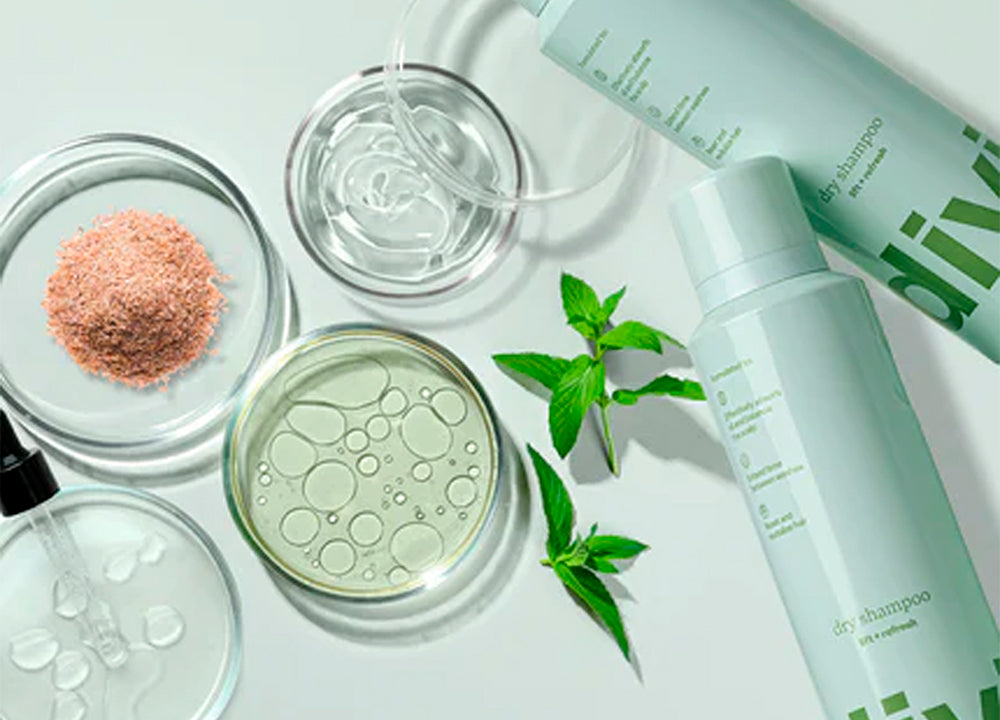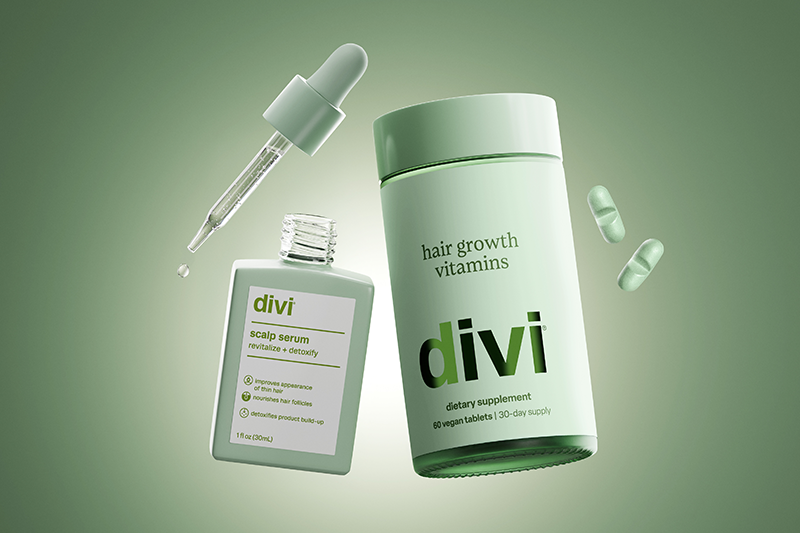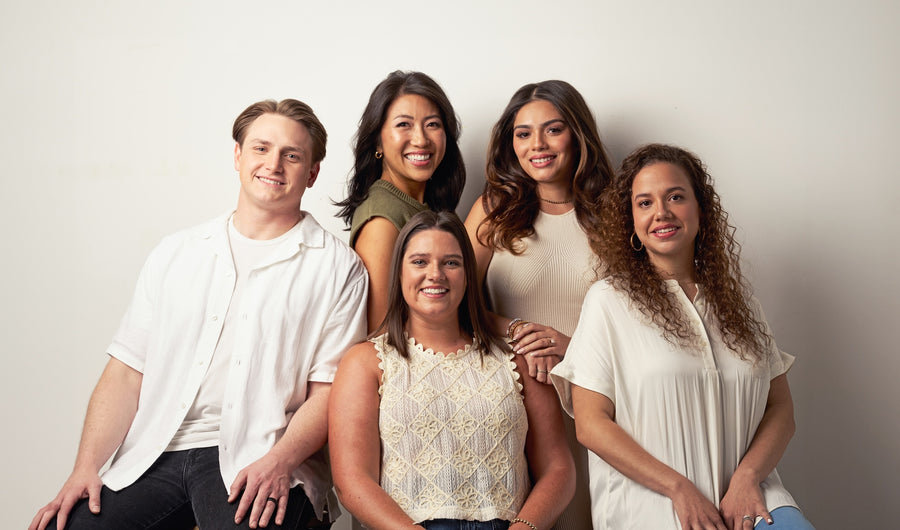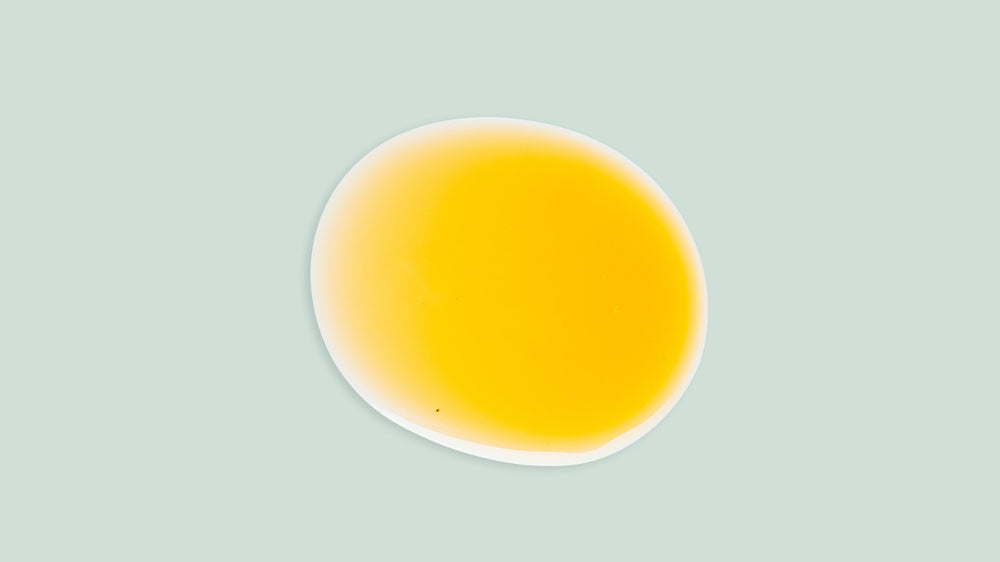Tea tree oil is an herbal extract from Australia’s tea tree (Melaleuca alternifolia) and has a long list of medicinal uses thanks to its antifungal and antimicrobial properties. One of those uses is as an ingredient in haircare and soaps, and it’s one of the most potent ingredients in Divi’s Scalp Serum formula.
The haircare experts from Divi have explained tea tree oil’s benefits for treating hair loss and show how you can use our Scalp Serum to achieve optimal scalp health and thick, shiny hair.
At Divi, we have long known the many benefits of using tea tree oil for men and women suffering from hair loss and scalp conditions like dandruff, dry skin, eczema and more. We developed Divi’s Scalp Serum using clean, scientifically backed ingredients and created a vegan-friendly, lightweight formula to target the root causes of thinning hair and an unhealthy scalp. Keep reading as we explain the many benefits of tea tree oil for treating hair loss and how you can use Divi’s Scalp Serum to get fuller, thicker hair.
What Is Tea Tree Oil?
The melaleuca oil-rich tea tree grows in the thick swamps of Australia’s southeast coast, including New South Wales and Queensland. The country’s native Aboriginal people have steamed and crushed the tree’s leaves to extract the oil for hundreds of years, using it as an herbal medicine and antiseptic.
The oil provides powerful health and wellness benefits thanks to the compound terpinen-4-ol, which has antimicrobial, anti-inflammatory, antiviral and antifungal properties.
Which Scalp and Hair Conditions Tea Tree Oil Can Treat
Although Divi’s Scalp Serum contains many clean, science-backed ingredients to combat the symptoms of an unhealthy scalp and thinning hair, tea tree oil is one of the most effective. Next, we’ll discuss the many hair and scalp conditions tea tree oil can treat, including dandruff, psoriasis, eczema, excessive hair fall and more.
Dandruff
Dandruff causes small pieces of scalp skin to flake off and can sometimes cause itching. Men are more likely than women to suffer from dandruff, and it has a few causes, including:
- Dry skin
- Oily, irritated skin
- A yeast-like fungus that feeds on the scalp’s natural oils (Malassezia)
- Skin sensitivity
- Certain skin conditions (i.e., eczema, psoriasis)
Regardless of the cause, dandruff can feel embarrassing and is a difficult condition to eradicate.
Tea tree oil can help reverse the symptoms of dandruff and improve scalp health. In one study, researchers examined the efficacy of a 5% tea tree oil shampoo in patients with mild to moderate dandruff caused by Malassezia yeast. After four weeks, patients using the tea tree oil shampoo showed a 41% improvement compared to an 11% improvement in the placebo group (patients who weren’t using the tea tree oil shampoo). In addition, no patients reported an allergic reaction or other adverse effects.
Another study from 2017 examined the effectiveness of managing dandruff using chemical and herbal agents (again, caused by Malassezia) and had positive results. Patients using tea tree oil showed a 78% overall reduction in microbial growth, beating out the common anti-dandruff treatments of ketoconazole and zinc pyrithione. The oil’s antimicrobial and antiseptic properties can clear away the build-up of dead skin cells, sebum, hair products and other gunk clogging hair follicles and causing dandruff and inflammation.
Seborrheic Dermatitis
Seborrheic dermatitis is a prevalent skin disorder causing chronic inflammation, scaly patches, and flaky, itchy skin. Usually, it affects oily areas, like the scalp, back, and face and is likely caused by the Malassezia yeast, excess oil in the glands, or an immune system problem. In severe cases, it can cause patches of yellow-gray, oily-looking skin on the scalp, face, back and upper chest. It affects about 11.6% of the general population.
The most common treatments for seborrheic dermatitis are anti-inflammatory and antifungal, making tea tree oil an ideal herbal compound for this condition. The topical use of tea tree oil (5% concentration) is beneficial for treating seborrheic dermatitis and shows promise as a natural alternative to harsh medications. Another study examined the efficacy of tea tree oil against Malassezia on canines, which showed excellent antibacterial activity and significant results against several strains of the fungus-like yeast.
Eczema
Tea tree oil extract contains powerful herbal compounds rich in health and wellness benefits, including anti-inflammatory, antifungal, antimicrobial, antiseptic and antibacterial properties. If you have eczema on your scalp, using Divi’s Scalp Serum can help you take advantage of the medicinal properties of tea tree oil and the other ingredients in our formula.
Research shows tea tree oil is a natural and effective way to treat the signs and symptoms of eczema (atopic dermatitis), which causes inflamed and irritable skin, itchy rashes, and oozing blisters. In one 2011 study, researchers proved that topical tea tree oil was significantly more effective than using clobetasone butyrate creams and zinc oxide, with the three tested products reducing symptoms by 40.5%, 23.5% and 17.4%, respectively.
Male-Pattern Baldness and Female-Pattern Hair Loss
Androgenic alopecia, otherwise known as male-pattern baldness and female-pattern hair loss, is the primary genetic cause of hair loss in both men and women. Although it affects males more than females, both genetic predisposition and aging contribute to excessive hair fall and thinning. However, tea tree oil may be an effective treatment for combating androgenic alopecia hair loss symptoms thanks to its anti-inflammatory and antimicrobial properties.
Consider this study: researchers examined the safety and efficacy of using tea tree oil, minoxidil (brand name: Rogaine) and diclofenac (an anti-inflammatory) compared to only minoxidil for treating hair loss. The researchers eventually discovered that using tea tree oil, diclofenac and minoxidil was significantly superior and more effective at promoting hair growth than minoxidil alone. Furthermore, poor scalp circulation can contribute to hair loss. Tea tree oil energizes the scalp and encourages blood flow, invigorating hair follicles and promoting new hair growth.
Another study examined the effectiveness of tea tree oil, minoxidil and diclofenac as hair growth agents compared to using minoxidil. Combining ingredients in a hair mask resulted in a significantly better improvement in hair count, hair thickness and hair weight. In addition, it improved the patients’ appearance, slowed hair loss, and increased hair growth.
Non-Bacterial Folliculitis
Folliculitis occurs when bacteria or a fungus causes an infection in the hair follicles, which are the tiny openings in the skin where each strand of hair grows. Folliculitis commonly manifests on the scalp, and symptoms include itchiness, irritation, soreness, dry, flaky skin and a stinging or burning sensation.
Tea tree oil is beneficial for treating skin conditions like folliculitis. One study looked at the efficacy of tea tree oil against common fungal species, including Malassezia, which frequently cause poor hair and scalp health conditions like folliculitis. The results showed each species was susceptible to the antifungal properties of tea tree oil, highlighting favorable clinical outcomes.
Head Lice
Head lice is another common scalp and hair problem. These itchy, pesky parasites can be extremely difficult to eliminate, and using more common treatments containing harsh chemicals isn’t always the best treatment option. However, tea tree oil is a potent herbal medicine and studies have proven it to be an effective compound for killing head lice.
One study evaluated the effectiveness of tea tree oil and nerolidol (another terpene-based herbal compound) in killing head lice. After 30 minutes of washing with a 1% concentration of tea tree oil, 100% of the head lice were killed. After washing with a 1:2 tea tree oil and nerolidol mix, all of the lice were killed after 20 minutes and the combination of oils was also effective at killing lice eggs, with a 100% abortive rate after seven days of use.
Oily, Clogged Hair Follicles
The skin on your scalp produces more oil (a.k.a. sebum) than other areas on your body, like your forearms or thighs. The increased oil production and combination of dead skin cells, sweat and hair products cause a build-up of gunk and can lead to greasy hair and a flaky scalp. Neglecting to treat it can cause dandruff, acne, or infections in the hair follicles.
Fortunately, tea tree oil is an excellent way to treat the build-up of oil, skin cells, and sweat on your scalp and hair strands. With its antimicrobial and antiseptic properties, this essential oil can remove all the nasty build-up on your hair follicles and scalp, healing infections and creating a healthy follicular environment to support hair growth. Plus, once the tea tree oil clears up your clogged follicles and pores, it allows your scalp to soak up the nutrients it needs to replenish your hair and help give you strong, smooth strands.
How to Use Tea Tree Oil and Divi’s Scalp Serum to Combat Hair Loss and Promote a Healthy Scalp
As you can see, there are numerous benefits of tea tree oil for treating hair loss and other common scalp conditions, from dandruff and eczema to head lice and thinning hair. So, how can you harness the power of this clean ingredient and gain those excellent benefits for yourself? The haircare experts at Divi have you covered.
Our scientific research team developed Divi’s Scalp Serum formula to contain proven ingredients to fight hair loss and encourage new, healthier growth. In addition to tea tree oil, Divi’s formula contains many other vegan-friendly and effective ingredients, including peppermint oil, arginine, copper tripeptide-1, hyaluronic acid, eucalyptus oil, caffeine, rosemary leaf extract, amino acids and more.
These ingredients work synergistically to provide you with robust hair benefits. Our formula can help you:
- Increase hair follicle size
- Stimulate blood flow to the scalp
- Boost strength and shine
- Prevent follicle death
- Get smooth, silky hair
- Increase hair weight, count and thickness
- Promote optimal scalp health
- Prevent excessive hair fall
- Encourage new hair growth
Although our Scalp Serum can give you some incredible results, it’s important to note that our products aren’t a cure for baldness. Our formula can treat the symptoms of hair loss, but it doesn’t cure the root cause.
How to Use Divi’s Scalp Serum
Our clean, lightweight serum is easy to use. There’s no need to spend additional time on your daily health and beauty regimen; we’ve made it simple and straightforward for both men and women to enjoy the benefits of Divi’s Scalp Serum. Here’s how you do it once a day, either in the morning or at night:
- Fill up about ¾ of the serum dropper
- Apply to trouble areas or over the entire scalp
- No need to rinse; just allow it to absorb as you go about your day or sleep at night!
It’s that simple!
Harness the Power of Tea Tree Oil with Divi’s Hair and Scalp Serum
By age 50, about half of all men and a quarter of women will experience age-related hair loss and thinning. Instead of looking in the mirror and feeling self-conscious about your hair problems, be proactive and try our protein-rich Scalp Serum formula to combat hair loss and support a healthy scalp.
With our vegan-friendly formula, you can take advantage of the many benefits of tea tree oil for treating hair loss. Why not give it a try? Order your first (or next) bottle of Divi’s Scalp Serum today, and start feeling your confidence grow from the inside out.




































